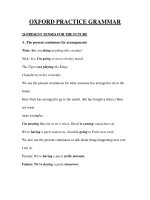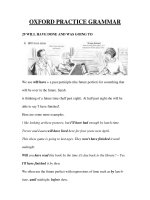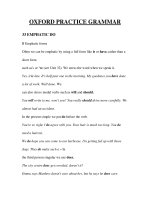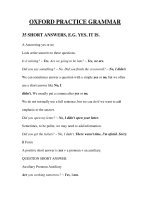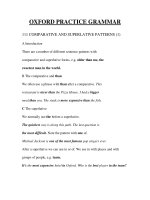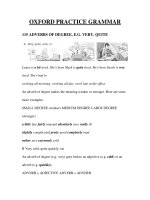Tài liệu OXFORD PRACTICE GRAMMAR 29 ppt
Bạn đang xem bản rút gọn của tài liệu. Xem và tải ngay bản đầy đủ của tài liệu tại đây (284.22 KB, 6 trang )
OXFORD PRACTICE GRAMMAR
29 WILL HAVE DONE AND WAS GOING TO
We use will have + a past participle (the future perfect) for something that
will be over in the future. Sarah
is thinking of a future time (half past eight). At half past eight she will be
able to say 'I have finished'.
Here are some more examples.
/ like looking at these pictures, but I'll have had enough by lunch-time.
Trevor and Laura will have lived here for four years next April.
This chess game is going to last ages. They won't have finished it until
midnight.
Will you have read this book by the time it's due back to the library? ~ Yes.
I'll have finished it by then.
We often use the future perfect with expressions of time such as by lunch-
time, until midnight, before then,
by the time you have to take it back.
We can use be going to in the past tense to express an intention in the past.
Trevor intended to put the
shelves up yesterday. Often the intended action did not happen. In fact
Trevor did not put the shelves up.
Here are some more examples.
/ was going to tidy the flat, but I didn't have time.
Daniel wasn't going to spend any money, but he saw a jacket he just had to
buy.
The girls left early. They were going to catch the eight o'clock train.
So you went to the airport without a ticket. Where were you going to fly to?
The woman walked away just as I was going to speak to her. (just as = at the
moment when)
We can also use was going to for a prediction in the past.
/ knew something was going to go wrong with the plan.
Would has a similar meaning (see Unit 134C).
/ knew something would go wrong with the plan.
29 EXERCISES
1 Will have done (A)
Paul wants to be an artist. He's reading about a famous artist called Winston
Plummer.
Winston Plummer was a great artist, who had a wonderful career. He won
lots of prizes
before he was twenty. By the age of twenty-five he had had his own
exhibition. He was the
subject of a TV documentary by the time he was thirty. By the age of thirty-
five he had
become world-famous. He made millions of pounds from his pictures before
he was forty.
Paul is daydreaming about his own future career. What is he thinking?
► I hope /'// have won lots of prizes before I'm twenty.
1 Perhaps …………………………………………………............ my own
exhibition by the age of twenty-five.
2 I wonder if ......................................................................................... by the
time I'm thirty.
3 Maybe
………………………………………………………………………….by the
age of thirty-five.
4 I hope
...................................................................................................................... by
the age of forty.
2 Will have done (A)
How good is your maths? Can you work out the answers?
► It's quarter to six. Melanie is putting something in the oven.
It needs to be in the oven for an hour and a half. When will it have cooked?
It
will have cooked at quarter past seven.
1 It's seven o'clock in the evening, and Andrew is starting to write an essay.
He writes one page every
fifteen minutes. He plans to finish the essay at midnight. How many pages
will he have written?
He will have written ............................... pages.
2 It's Monday morning, and Sarah is travelling to work. It's twenty miles
from her home to the office.
How far will she have travelled to and from work by the time she gets home
on Friday?
3 Matthew is doing press-ups — one every two seconds. How many will he
have done after five minutes?
3 Was going to (B)
Complete the sentences. They are all about being just too late.
Use was/were going to with these verbs: go, get, see, pick
► The train left just as Mike was going to get on it.
1 I'm afraid the shop closed just as we……………………………….in.
2 The phone stopped ringing just as Melanie ........……………........ it up.
3 We …………………. ................ a film about the Mafia, but the tickets
were sold out.
4 Was going to (B)
Trevor is always making excuses for not doing things. Complete his
sentences.
► put up the shelves / not have any screws
Sorry. I was going to put up the shelves, but I didn't have any screws.
1 paint the door / not feel very well
Sorry. ......................................................................................................
2 repair the lamp / forget

